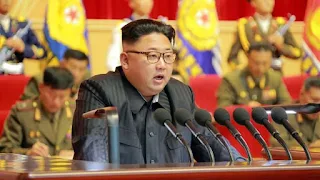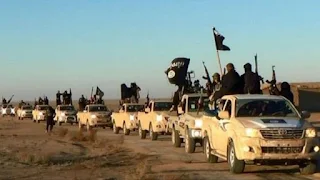Is North Korea's leader Kim Jong-un rational?
Is Kim Jong-un rational? The new US ambassador to the United Nations thinks he is not. Nikki Haley said after North Korea's simultaneous launch of four ballistic missiles: "This is not a rational person." But is she right?
Kim Jong-un may have many flaws. He is without doubt ruthless - the bereaved relatives of the victims of his regime, including within his own family, would testify to that. He may have driven through an economic policy that keeps his people living at a standard way below that in South Korea and, increasingly, China.
And he seems to have personal issues, such as eating a lot - photographs show his bulging girth - and being a fairly heavy smoker.
But whatever these failings and foibles, is he actually irrational - which the Oxford English Dictionary defines as "not logical or reasonable, not endowed with the power of reason"?
Scholars who study him think he is behaving very rationally, even with the purging and terrorising of those around him. Prof Andrei Lankov of Kookmin University in Seoul told the BBC: "He is perfectly rational. He sometimes overdoes it. He sometimes tends to apply excessive force. Why kill hundreds of generals when dozens will do?
"Most people he kills would never join a conspiracy but he feels it's better to overdo it. It's better to kill nine loyal generals and one potential conspirator than to allow a conspirator to stay alive.
"But he is rational."
Prof John Delury of Yonsei University in Seoul said that even having his half-brother killed (as the allegation is - denied by Pyongyang) would be a rational act; not nice but rational.
"A sad fact of history is that young kings often kill their uncles and elder brothers. It may be cruel, but it is not 'irrational'. If you don't take my word for it, read Shakespeare."
- Kim Jong-nam death: Interpol 'red notice' for North Koreans
- How do you solve a problem like North Korea?
- North Korea's nuclear programme: How advanced is it?
- North Korea country profile
On this assassination of Kim Jong-nam, allegedly at the hands of agents of the regime, Prof Lankov says it is similar to the Ottoman Empire, where concubines of the Sultan had countless children, any of whom had a bloodline that might one day legitimise a claim to the throne.
Prof Lankov thinks that Kim Jong-nam was, accordingly, a threat, probably not that great a one but still intolerable: "Probably he was not that dangerous but you never know. He was definitely under Chinese control."
Prof Delury said that there was nothing irrational about Kim Jong-un's drive to obtain credible nuclear weapons: "He has no reliable allies to guarantee his safety, and he faces a hostile superpower that has, in recent memory, invaded sovereign states around the world and overthrown their governments.
"The lesson North Koreans learned from the invasion of Iraq was that if Saddam Hussein really possessed those weapons of mass destruction, he might have survived."
This was compounded by the lesson of Libya, according to Prof Lankov: "Did American promises of American prosperity help Gaddafi and his family? Kim Jong-un knows perfectly well what happened to the only fool who believed Western promises and renounced the development of nuclear weapons. And he's not going to make that mistake. Once you don't have nuclear weapons you are completely unprotected.
"Did Russian or American and British promises to guarantee Ukrainian integrity help Ukraine? No. Why should he expect American, Russian or Chinese promises to help him stay alive? He is rational."
If he is rational, what does he want? On this, scholars are divided. Prof Brian Myers of Dongseo University in Busan in South Korea said that Kim Jong-un wants security but also a united Korea as the only way he and the regime can survive in the long term.
"As every North Korean knows, the whole point of the military-first policy is 'final victory', or the unification of the peninsula under North Korean rule."
A credible nuclear force would give him the ability to pressure the United States to remove its troops from the peninsula.
"North Korea needs the capability to strike the US with nuclear weapons in order to pressure both adversaries into signing peace treaties. This is the only grand bargain it has ever wanted," said Prof Myers.
And once the US troops had gone, on this argument, North Korean rule would be unstoppable.
Prof Lankov doesn't agree with the emphasis. He thinks survival is by far the most important motive behind Kim Jong-un's actions: "Above all, he wants to stay alive. Second, economic prosperity and growth - but it's a distant second."
So what's to be done? Prof Lankov sees no good options: "I don't see any solution right now." He thinks the best option is to persuade North Korea to freeze its development of nuclear weapons at a particular size of arsenal "but it will be very difficulty and North Koreans may not keep their promises".
And money would have to be paid. "But this deal isn't good from an American point of view because it means paying a reward to a blackmailer, and if you pay a reward to a blackmailer once, you invite more blackmail.
"The second option which might work is a military operation but that is likely to trigger a second Korean war and will permanently damage American credibility as a reliable ally and protector.
"Worldwide, a lot of people would see that it's better to have enemies than such friends."
BBC NEWS




















